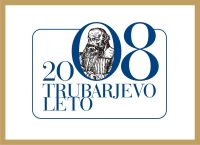|
Trubar was at the zenith of his ecclesiastical career in the Roman Catholic Church, at the age of 39, canon of the Ljubljana Cathedral, posted to Šentjernej na Dolenjskem, when he was arrested and imprisoned by imperial decree from Vienna, along with three other people who had also embraced new religious views. It was in 1547. Trubar avoided arrest by escaping to Nuremberg in Germany. A theologian, Veit Dietrich, prepared Trubar for conversion to the Evangelical Lutheran Church and procured him a new job of evangelical pastor in the nearby town of Rothenburg ob der Tauber. Trubar was 40 when he took up his office in the hospital church. The following year, 1549, he married Barbara Sitar, who had joined him in Germany from Kranj, and started a family; along with the birth of his first child, the first Slovene books, Catechismus (Catechism) and Abecedarium (Primer), were published in 1550 in Tübingen.
Is this some other and different Primož Trubar from the one who had previously lived in Slovenia? Only in outward appearance. He converted to Evangelicalism from necessity; until then, he had followed the example of his role model, Pietro Bonomo, the bishop of Trieste, who advocated reform within the Catholic Church. Trubar lived in the territory of present-day Germany from his 40th year until he was 78 years old. He returned to his homeland only for three years between 1562 and 1565; he lived in Ljubljana, where he was superintendent of the Protestant Church of the Slovene lands, for which he wrote his most original book, Cerkovna ordninga (Church Canon). At the age of 57, he was expelled from his country for the second, and last, time. His last official post was to Derendingen, near Tübingen (Germany) where he coined the word “nigdirdom”, at home nowhere!
He could have lost the will to live since cruel fate pushed him into exile. It would have been easier for him to immerse himself in the German world, to integrate and forget his misfortunes. On the contrary Primož Trubar’s greatness is indeed in creatively overcoming the blows that life had dealt him and re-emerging, as the first “Slovene Phoenix”, unscathed and victorious, from the ashes of his dual exile when he lost all he had. It was his strong religious belief and dedication to his spiritual mission that kept him going. “Stand and withstand” is his well-known motto, behind which lies his life’s work and his idealism, his strong personality and deep love for the Slovene nation. Instead of bitterness, grievances and revenge, he left a legacy of values on the basis of which “this simple people of Slovene lands …” has grown and matured as a cultural nation today, and which Prešeren drew on when he wrote: “God’s blessing on all nations…”
In south-western Germany, Primož Trubar worked for four times as an evangelical pastor. He left Rothenburg ob der Tauber and went to Kempten, near the border with Switzerland, where he experienced his most creative period lasting from 1553 to 1560 and started translating the Bible. When in 1560 the provincial estates appointed him as superintendent of the Evangelical-Lutheran Church in Carniola, he completely immersed himself in a project of establishing a Slovene Croatian or southern Slavonic Biblical printing house in Urach, near Tübingen. In order to be able to manage the business well as the head of the Biblical institute, he took the position of pastor in Urach for two years. After being expelled for the second time, he was assigned to a parish in Lauffen within the Heilbronn district for a few months, and as early as the next year, in 1566, when he was 58 years old, he took his last job in Derendingen, in the district of Tübingen.
By the time of his death in Derendingen in 1586, he had written 26 books and translated the entire New Testament, and two years before his death, he lived to see the entire Bible being translated into Slovene – a work done by his disciple, Jurij Dalmatin. When he worked in the territory of Germany – in Rothenburg ob der Tauber, Kempten, Tübingen and Urach – he was not only a pastor of evangelical parishes, but also one of the leaders of the national awakening, an organiser and diplomat, who became one of the prominent European figures of that time. His project of the South Slavonic Bible institute in Urach, where he established a printing house for publishing books in the Glagolitic and Cyrillic scripts, is known in evangelical historical resources as the first missionary project. What a farsighted European project this was, then, in the 16th century! Only a person of such greatness, as Trubar was indeed, was, as a foreigner and immigrant in the heart of the Europe of that time, capable of bringing to the fore his creative and original genius.
The name Primož Trubar sounds familiar in all German towns where he worked, especially in Tübingen and Derendingen. A street, parsonage, kindergarten and church are named after him. In the year of Primož Trubar, he is also being commemorated in Kempten and Rothenburg ob der Tauber with a number of ceremonies and events: lectures, exhibitions, symposia, ecumenical services, visits by Slovene groups and delegations, and naming of the town square in front of the church in both the aforementioned towns. In Germany, Primož Trubar remains vividly etched in the mind and memory of many people. He of course cannot be written in the hearts of people there, in his nigdirdom, but rather there where, in spiritual terms, his home has always been – in the hearts of his “lubi Slovenci” (beloved Slovenes).
Text by Dr Zvone Štrubelj, published in Trubar's Year 2008, Ljubljana 2008.
|

